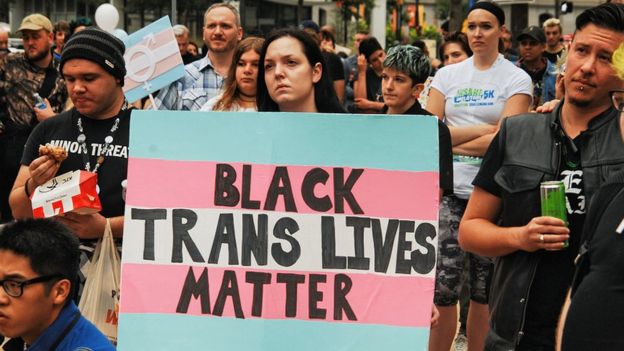
Kathmandu (Pahichan) September 27 – “It was election night 2016. I was at a joke ‘end of the world’ theme party – nobody thought Donald Trump would actually win. His victory sealed the deal and pushed me to run.”
Back then, Phillipe Cunningham, a transgender man of colour, was working as a policy advisor in the mayor’s office in Minneapolis in America’s Midwest. Trump’s arrival in the White House was the tipping point that persuaded him to run for election to the city council there in 2017.
And it seems he’s not alone in being persuaded to take the plunge into politics in the wake of the 2016 presidential election. Across the US, there’s been a rise in individuals from the LGBT community winning electoral office.
In 2018, this increase in representation was described as “a rainbow wave” by pro-LGBT leadership group, the Victory Institute. In a report published in June, it says the number of trans elected officials at state and local level has grown by almost 54% over the past year.
“More diversity in elected leadership is always a good thing, because it adds perspectives from people with different lived experiences. It makes for a more equal system,” Phillipe, 32, tells Radio 1 Newsbeat.
“I have lived my life for 23 years as a black woman and the last nine as a black man – I know what it’s like to be marginalised.”
 Image copyrightPHILLIPE CUNNINGHAM
Image copyrightPHILLIPE CUNNINGHAMAccording to the Victory Institute, there are currently 20 elected officials who identify as transgender, including Phillipe.
None of these, though, are at the highest level of state or national government – such as the US Congress or state senates.
There is a chance this could change, however, with Sarah McBride, a 29-year-old trans woman running to be a state senator in Delaware in 2020.
If she wins, she’d be America’s first openly transgender state senator.
Sarah was an intern in the Obama White House – making her the first openly trans woman to work in the White House.
She already enjoys the support of prominent figures such as Democratic presidential candidate Joe Biden.
He wrote the foreword to her memoir about her fight for trans equality and the death of her late husband, Andy – a trans man and fellow activist.
 Image copyrightFRIENDS OF SARAH MCBRIDE
Image copyrightFRIENDS OF SARAH MCBRIDEThe Trump administration has been “pretty thorough in attacking and dismantling pretty much all of the protections” introduced under Obama, according to Sharita Gruberg – who oversees LGBT policy research at the liberal US think tank, Center for American Progress.
From the military and education to healthcare and the workplace, the Trump administration has made some “pretty significant attacks on trans people,” says Sharita.
A new rule banning certain transgender people from the military was allowed by the US Supreme Court in January – with legal challenges around this issue ongoing.
In 2017, President Trump tweeted that “tremendous medical costs and disruption” was the reason behind the trans ban.
Under Obama, the US government was prepared to pay the medical costs of transgender people serving in the military.
A spokeswoman from the US Department of Defence said the military treats “all transgender persons with respect and dignity” and the new policy was “based on professional military judgement”.
 Image copyrightGETTY IMAGES
Image copyrightGETTY IMAGESRule changes have also been proposed for healthcare and the workplace – which would remove sex discrimination protections for trans people.
This means it would be harder for trans people to find proper healthcare and that employers could sack someone for being transgender.
But the Trump administration says its healthcare policy is intended to reduce costs and points to $3.6bn (£2.9bn) it could save – which would be used to provide additional services.
“Members of the community want to fight back against the Trump administration,” says Taylor Glickman, a 23-year-old trans man from Massachusetts.
He adds that the current atmosphere in the US makes it “more important than ever” for people from his community to feel represented.
Although he currently has no plans to run for office himself, Taylor is acutely aware of the need for people in power to understand the challenges LGBT people come up against. For him, it really hit home when he faced difficulties getting his hormone injections.
 Image copyrightTAYLOR GLICKMAN
Image copyrightTAYLOR GLICKMANThe first National Trans Visibility March is due to take place in Washington DC on 28 September, with attendance expected to be in the thousands.
It’s a response to the “blatant disrespect the president has shown”, Taylor claims.
Phillipe thinks there’s been a social shift which means more trans individuals feel able to openly run for office and fight back.
“We live in a time when it’s more socially acceptable to show kindness to the LGBTQ community.”
Mark Mellman, a columnist for US political newspaper The Hill, wrote in June that attitudes towards transgender people are improving, partly due to “increased awareness of those we know and love having different kinds of gender identities”.
He adds that younger people have “more liberal attitudes” than previous generations, so the attitude shift is likely to intensify.
During his election campaign, President Trump said he’d be an ally of the LGBT community and would “do everything” in his “power to protect” them.

Earlier this year, he also became the first Republican President to acknowledge Pride month:

And in a speech to the UN this week, he expressed “solidarity with LGBTQ people”.
But for Taylor, the government’s actions make these empty words by President Trump.
“I don’t trust a single word that comes out of his or his administration’s mouth.
“Quite frankly, him being an ally to the transgender community is not a thing I ever expected to happen.”
Phillipe says one of the “top issues” that needs to be tackled on a national level is attacks against trans women of colour.
In 2018, there were at least 26 deaths of transgender people in the US from fatal violence, the majority of who were women of colour, according to the Human Rights Campaign – America’s largest civil rights organisation.
This year, the organisation has recorded 18 incidents of transgender people being killed.
The American Medical Association describes this as an “epidemic of violence against the transgender community”.
 Image copyrightGETTY IMAGES
Image copyrightGETTY IMAGESAnd is running for office just about trans issues?
Not for Phillipe, who says he wants to improve life in Minneapolis for everyone.
“I’m focused on poverty and making sure all of my constituents are safe from gun violence.”
He adds that he’s motivated by the idea of building a better, more equal, future.
“I am constantly meeting parents of trans kids who want their kids to be reflected in their government.
“We’re changing the course of history.”
Source : BBC
Copyright © All right reserved to pahichan.com Site By: Sobij.